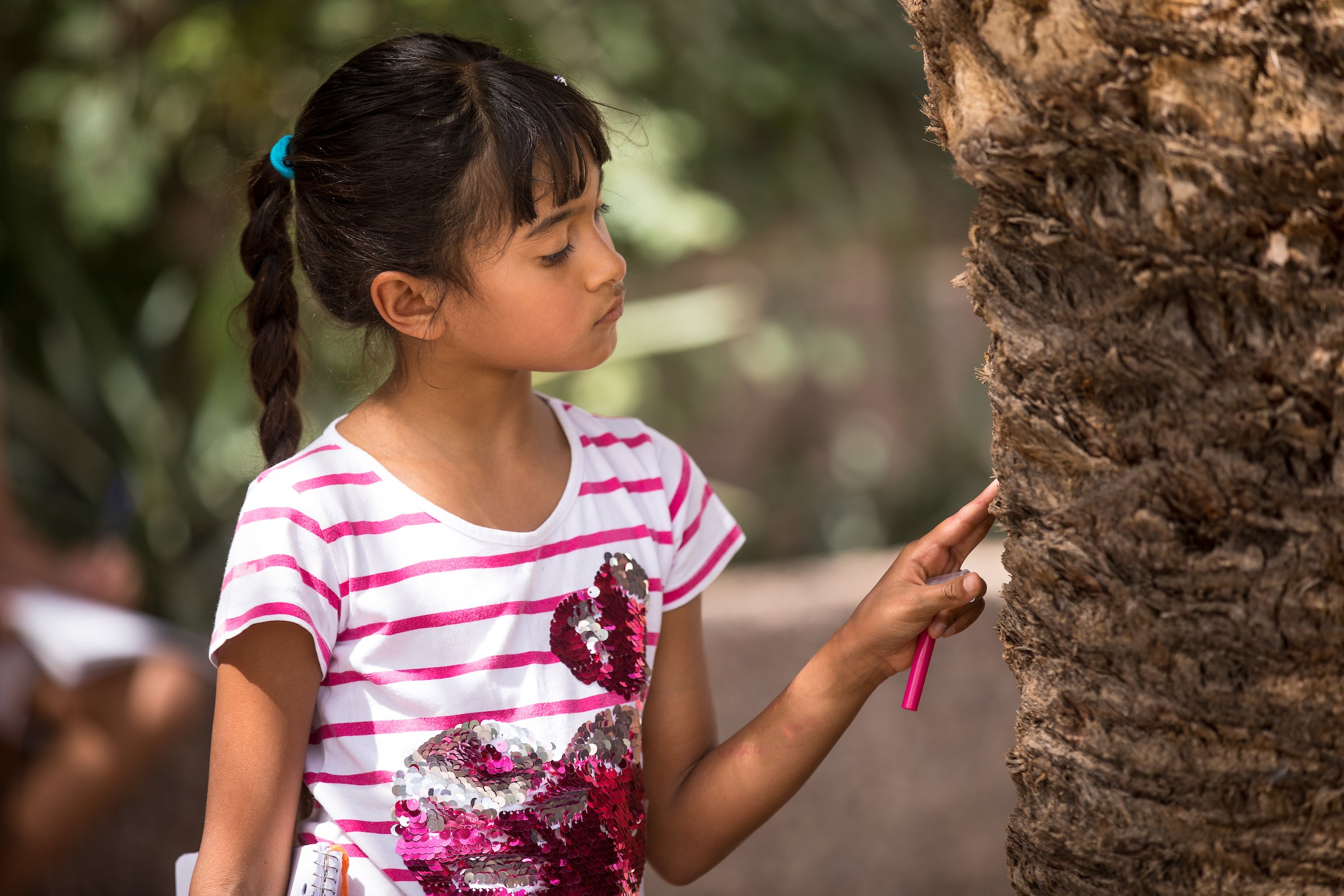As Dorothy and the Scarecrow learned, sometimes nature talks back. In the land of Oz, that meant taking an apple in the face from a tree. For a group of elementary students attending the Young Adult Writing Program (YAWP) at ASU this month, the trees across the Tempe campus are responding in a much less frightening fashion — via email.
Associate Professor of English and director of YAWP’s parent organization, the Central Arizona Writing Project (a local offshoot of the National Writing Project), Jessica Early themed this year’s iteration of the program around the intersection of writing and science as part of the national project’s agenda to embed innovative writing instruction into science learning for youth.
And that’s not the only way folks at ASU are providing kids with an appreciation for and strong foundation of knowledge about the natural world: The Sustainability Teachers’ Academy has been educating K–12 teachers across the nation on how to incorporate sustainability science into their classroom curriculum since 2015.
Mankind’s current trajectory as it relates to the Earth’s resources is not sustainable, said Molly Cashion, regional program manager for the Sustainability Teachers’ Academy. “So it’s really beneficial to students to start that kind of thinking earlier in the K–12 sphere because it’s going to inform the way we’ll move forward in the future with jobs and how we live in the world.”
The trees write back
Early’s idea to have kids write to trees as part of YAWP was inspired by an Atlantic article detailing a program in Melbourne, Australia, where various trees were assigned email addresses so that residents could report issues like dangerous branches. Instead, people wrote musing letters to the trees about their beauty, current events and life in general.
That kind of engagement with nature and the respect it engenders is exactly what Early was hoping to achieve, and it appears to have worked — more than one of the children wrote to the trees on ASU’s campus thanking them for providing the oxygen that allows them to live.
Still more were besotted with a sudden curiosity for the all things green, asking questions like, Why is stuff poisonous? And, why do avocados have seeds?
“The idea is to inspire a feeling of wonder in kids when it comes to the outdoors,” said Kelly Hedberg, program instructor and founder of Dig It! Outdoors, an after-school gardening program that specializes in garden-based education for children, adults and educators in Arizona schools, community and public settings.
“In school we don’t really learn about nature,” said Jackson Sitchler, 10, who attends Ward Traditional Academy in Tempe. But he was clearly enjoying himself at YAWP — an anthropomorphized onion he drew to illustrate a writing assignment sparked dozens of questions from other kids wanting to know things like, Do onions have genders?
Catalina Bracamonte, 8, of Phoenix, examines the texture of a palm tree at the Young Adult Writing Program for fourth and fifth graders from around the Valley on June 6, 2018. Photo by Charlie Leight/ASU Now
Early met Hedberg and fellow YAWP instructor and Dig It! Outdoors educator Cory Pfitzer through the program’s involvement with Broadmor Elementary in Tempe, where their children go to school.
Sensing an opportunity to leverage Hedberg and Pfitzer’s gardening knowledge in service of merging science education with the arts, Early invited them to attend a National Writing Project workshop on teaching writing and science, then worked with them to embed writing workshops into the Dig It! Outdoors curriculum for grades K–5 at Broadmor. Finally, they adapted that same model for YAWP.
“Their work as informal and formal educators to bridge science learning and writing practice is creative, innovative, and socially and environmentally embedded,” Early said. “This is some of the most rewarding work I get to be a part of, and I am inspired by such amazing educators and the ways they are influencing Arizona youth at local schools, in the community and at ASU.”
Sustainability education starts early
And it appears ASU programs like the Sustainability Teachers’ Academy are influencing local educators in kind. Recently, Jilliann Feltham, a nutrition education program coordinator for the Osborn School District in Phoenix and an alum of the academy, collaborated with ASU sustainability alum Amanda Coates to implement a composting program at schools in the district.
“It’s a really great example of how the academy doesn’t just show teachers how to teach sustainability science curriculum” but also encourages them to demonstrate it through tangible projects, Cashion said.
The Sustainability Teachers' Academy is hosting three five-day workshops for K–12 teachers this summer: at the University of Montana June 18–22; at Paul Smith’s College July 16–20; and at Emory and Henry College July 30-Aug. 3.
The academy is also working to develop a database detailing sustainability projects teachers have created to serve as a resource for others, which will be accessible later this year, and hopes to put more of an emphasis on helping local schools with such longer-term endeavors as continued teacher training and connecting with local stakeholders.
Top photo: YAWP instructor and Dig It! Outdoors educator Kelly Hedberg teaches kids about the texture of the eucalyptus tree bark on ASU's Tempe campus. Photo by Charlie Leight/ASU Now
More Environment and sustainability

Floods linked to rise in US deaths from several major causes
New research, co-authored by Arizona State University Assistant Professor Aaron Flores and published in Nature Medicine, uncovers a concerning link between severe flooding and increased…

ASU partners with education production company to share research with online learners
Through Arizona State University’s partnership with Complexly education production company, the online educational initiative Study Hall has forged a new pathway for students to earn college credits…

First-year students get immersive cultural, sustainability lessons in Costa Rica
Studying abroad can be a life-changing experience for any student, let alone a new student who just completed their first semester in college.That's what more than 50 Arizona State University…

